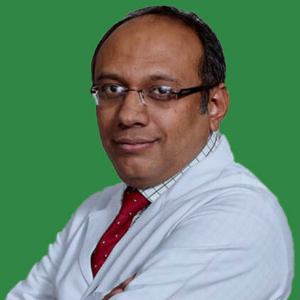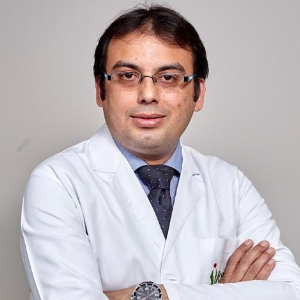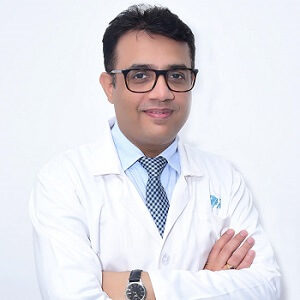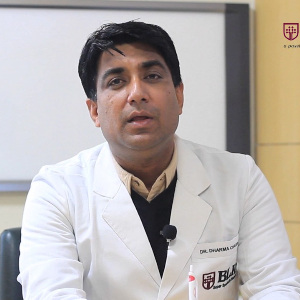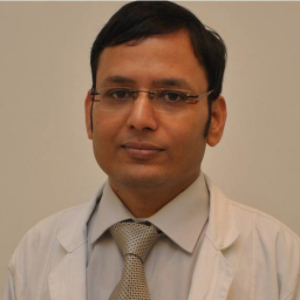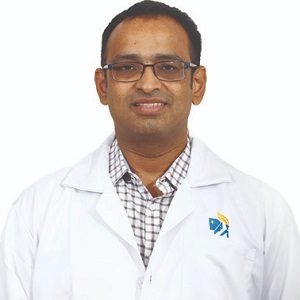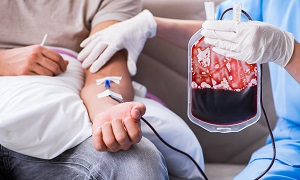Best Doctors in India for Aplastic Anemia Treatment
- Hematologist & BMT Specialist, Gurugram, India
- Over 20 years’ experience
- Fortis Memorial Research Institute
Profile Highlights:
- Dr. Rahul Bhargava is a leading Hematologist and BMT specialist currently working at Fortis Memorial Research Institute, Gurugram.
- Dr. Bhargava has an experience of more than 20 years in Hematology, Pediatric Hemato Oncology, and BMT during which he has performed numerous BMTs with successful outcomes.
- He primarily specializes in Haploidentical and unrelated match transplants and has performed over 1500 transplants till date.
- In 2016, he became the first Indian doctor to perform and popularize BMT for Multiple Sclerosis.
- Hemato Oncologist, Gurugram, India
- Over 20 years’ experience
- Medanta-The Medicity, Gurgaon
Profile Highlights:
- Dr. Nitin Sood is a highly experienced Hematologist specializing in a wide range of blood disorders, including leukemia, lymphomas, multiple myeloma, amyloidosis, and various anemias such as thalassemia and sickle cell anemia.
- He also deals with complex conditions like bleeding and clotting disorders, as well as bone marr*w transplants.
- Currently, Dr. Nitin Sood holds the position of Director in the Department of Hemato Oncology and BMT at Medanta-The Medicity, Gurugram.
- BMT Specialist and Hemato-Oncologist, Gurugram, India
- Over 10 Years Experience
- Artemis Hospital, Gurgaon
Profile Highlights:
- Dr. Gaurav Dixit is a well-known BMT Specialist and Hemato-Oncologist in India, currently serving as the Unit Head of Hemato-Oncology at Artemis Hospital, Gurugram. His specialization primarily lies in leukemia, myeloma, lymphoma, and aplastic anemia.
- To date, Dr. Dixit has independently performed or been involved in over 500 BMTs. He is also credited for carrying out the first BMT in Kenya.
- Dr. Gaurav Dixit completed his MBBS and MD in general medicine from PGIMS Rohtak in 2008.
- Pediatric Hemato Oncologist & BMT Specialist, Gurugram, India
- Over 20 years’ experience
- Fortis Hospital Shalimar Bagh, Fortis Memorial Research Institute
Profile Highlights:
- Dr. Vikas Dua is one of the best Pediatric Hemato Oncologist and BMT specialist in India with over 200 pediatric BMTs to his credit.
- His primary area of expertise is Pediatric Haploidentical transplants, but he is also skilled in doing BMTs for pediatric patients with leukemia and thalassemia.
- He received his training in Pediatric BMT from St. Jude Children’s Research Hospital in Memphis and holds Fellowship in Pediatric BMT from the National University Hospital in Singapore.
- Top Pediatric Hemato-oncologist & BMT Specialist | Apollo Hospital, New Delhi, India
- 15+ Years Experience
- Indraprastha Apollo Hospital, New Delhi
Profile Highlights:
- Dr. Gaurav Kharya is one of India’s top pediatric hematologists. He has over 17 years of expertise and is affiliated with Indraprastha Apollo Hospital.
- Dr. Kharya specializes in Pediatric Hemato-Oncology, Immunology, and BMT. He has extensive expertise in transplanting in children with benign or malignant blood abnormalities, immunological disorders, and other conditions both nationally and internationally.
- Dr. Kharya performed around 600 BMTs with his team. He undertook the first Haploidentical BMT for sickle cell disease in India. He also depleted TCR alpha beta CD 19 in invitro by haploidentical BMT in a 4-month-old baby with severe combined immunodeficiency.
- Top Hemato Oncologist & BMT Specialist | Apollo Hospital, New Delhi, India
- 20+ Years Experience
- Indraprastha Apollo Hospital, New Delhi
Profile Highlights:
- Dr. Shishir Seth is a Hemato Oncologist and BMT specialist currently practicing at Indraprastha Apollo Hospital, New Delhi
- He is an expert Hematologist and Hemato-Oncologist with an interest in the management and treatment of different blood diseases (benign and malignant).
- He has performed over 200 Hematopoietic BMTs successfully of which 40 included Allogenic Haploidentical transplants and Antigen Mismatch transplants. He has also performed 300 Induction procedures for Acute Leukemia.
- With an experience of 20+ years in Hematology and BMT, Dr. Seth has achieved several feats in his career that have gained him immense popularity and recognition.
- Dr. Shishir Seth is involved with research work as well and has numerous publications in his name in various national and international journals.
- Top Hemato Oncologist & BMT Specialist | BLK Hospital, New Delhi, India
- 20+ Years Experience
- BLK Super Specialty Hospital, New Delhi
Profile Highlights:
- Dr. Dharma Choudhary is a renowned Hemato Oncologist and BMT specialist who is currently associated with BLK-Max Super Speciality Hospital, New Delhi. He serves as the Director and Senior Consultant at the Department of BMT and Hematology.
- With over 20 years of experience in the field, Dr. Choudhary holds the credit of performing some of the most complex BMTs in India and has had several successful results to his name.
- He has carried out more than 2000 life-saving transplants, establishing himself as one of the most trusted and experienced professionals in the field.
- Although adult leukemia and lymphoma (blood cancer) are his primary areas of expertise, he is also very skilled in treating solid tumors and a variety of benign blood diseases.
- Hematologist, Gurugram, India
- Over 17 years’ experience
- Paras Hospital Gurugram
Profile Highlights:
- Dr. Rahul Naithani is a highly skilled clinical Hematologist known for his expertise in Hemato Oncology and BMT. He is currently serving as the Director & HOD in the Department of Hematology and Hemat-oncology at Paras Hospitals in Gurugram.
- He has performed over 260 BMTs successfully, demonstrating his dedication to improving patient outcomes and advancing treatment options.
- He completed his MD in Pediatrics from Lady Hardinge Medical College in Delhi, followed by a DM in Clinical Hematology from AIIMS, New Delhi.
- Hematologist, Chennai, India
- Over 29 years’ experience
- Apollo Hospitals Greams Road
Profile Highlights:
- Dr. Prabu P is one of the top Hematologists in Tamil Nadu with an experience of more than 15+ years in the field.
- He gained most of his experience working in the United Kingdom and now practices at Apollo Hospital, Chennai.
- Dr. Prabu acquired experience in general and malignant pediatric hematology while working in the pediatric hematology unit of St James University Hospital, Leeds.
Best Hospitals in India for Aplastic Anemia Treatment
- City: Gurugram, India
Hospital Highlights:
- One of India’s best and largest multi-specialty hospitals, Medanta was built with the aim to bring India to the highest standards of medical care. The hospital has been providing the best medical services to its patients, since its inception, with care, commitment, and compassion.
- Equipped with 1250 beds, the hospital was founded by Dr. Naresh Trehan in the year 2009 with an aim to provide the best medical care at affordable costs. The hospital is spread across 43 acres and includes 45 operation theatres and 350 beds dedicated solely to ICU. The hospital includes over 800 doctors, and more than 22 specialty departments and has a dedicated floor for individual specialty in order to offer the best services under one roof.
- The hospital is considered one of the premier institutes in India for Cardiac Care and includes staffs and members of high caliber. The hospital has 6 distinct centers of excellence.
- City: Gurugram, India
Hospital Highlights:
- Artemis Hospital, established in 2007 in Gurugram, India, is a leading multi-specialty institution known for its excellence in patient care and advanced medical technology, offering comprehensive services across specialties like Cardiology, Oncology, Neurology, Orthopedics etc.
- Renowned for its patient-focused care, Artemis Hospital combines state-of-the-art infrastructure with a team of internationally trained doctors and surgeons, ensuring the highest standards of medical treatment.
- Accredited by JCI and NABH, Artemis Hospital meets global healthcare quality and safety standards, reflecting its commitment to providing compassionate, personalized care.
- The hospital is recognized for utilizing cutting-edge diagnostic and ther*peutic techniques, ensuring patients receive accurate diagnoses and effective treatments tailored to their needs.
- City: Chennai, India
Hospital Highlights:
- The Apollo Proton Cancer Centre in Chennai is the most sought-after private cancer hospital in India. It is an integrated facility that provides cutting-edge, all inclusive cancer treatment to patients all over the globe.
- The hospital is a part of the renowned Apollo Group which has a large network of over 74 hospitals in India and across the globe. Out of the 74 hospitals, 21 of them are cancer centres. However, Apollo Proton Cancer Centre is the only cancer hospital to have JCI accreditation.
- The Centre, which was established on the principles of excellence and expertise, unites a formidable medical staff led by some of the most illustrious figures in cancer treatment.
- The hospital follows the global ASTRO Model Policy. It is the same global policy which is followed by countries like USA, UK, and Europe.
- Apollo Proton Cancer Centre is among the very few hospitals in India to receive patients from First World countries such as USA, Canada, New Zealand, Australia, Singapore, Thailand, etc.
- Apart from that, it is also the first hospital in Chennai to receive patients from several countries like Uzbekistan, Kazakhstan, Turkmenistan, Georgia, Armenia, Azerbaijan, SAARC countries (Bangladesh, Nepal, Sri Lanka, Maldives, Bhutan, Afghanistan, and Pakistan), South Africa, Turkey, Egypt, etc.
- In fact, there is a dedicated team at the Apollo Proton Cancer Centre that serves only international patients. Thus, on a monthly basis, the Centre receives patients from across 32 countries.
- Moreover, there are certain treatments in Apollo Proton Cancer Centre that are not available in any other centre. APCC addresses all types of possible cancers that are usually not covered by any other centre.
- City: New Delhi, India
Hospital Highlights:
- Over the last 33 years, the Fortis Escorts Heart Institute has set new standards in cardiac treatment with groundbreaking research. It is now known around the world as a centre of expertise for Cardiac Bypass Surgery, Interventional Cardiology, Non-invasive Cardiology, Paediatric Cardiology, and Paediatric Cardiac Surgery.
- The hospital has cutting-edge laboratories that perform a wide range of diagnostic tests in Nuclear Medicine, Radiology, Biochemistry, Haematology, Transfusion Medicine, and Microbiology.
- Fortis Escorts Heart Institute boasts a diverse group of bright and experienced doctors who are backed up by a team of highly qualified, experienced, and devoted support professionals as well as cutting-edge equipment such as the recently installed Dual CT Scan.
- Approximately 200 cardiac doctors and 1600 personnel currently collaborate to manage over 14,500 admissions and 7,200 emergency situations each year. The hospital now has a 310-bed infrastructure, as well as five cath labs and a slew of other world-class amenities.
- City: Gurugram, India
Hospital Highlights:
- Fortis Memorial Research Institute (FMRI) is a premier multi-super-specialty, quaternary care hospital, known for its exceptional international faculty, top-tier clinicians, super-sub-specialists, and specialized nurses, all supported by cutting-edge technology.
- It is the flaship hospital of Fortis Healthcare Limited, part of IHH Healthcare Berhad, a leading integrated healthcare services provider in India. As one of the country’s largest healthcare organizations, Fortis operates 28 healthcare facilities with over 4,500 operational beds (including O&M facilities) and more than 400 diagnostic centers (including joint ventures).
- Recognized as one of the top hospitals in India, FMRI serves as a leading referral center and aspires to be the ‘Mecca of Healthcare’ for India and beyond. Its 11-acre campus is a testament to its commitment to providing world-class healthcare.
- Accredited by JCI and NABH, FMRI is dedicated to maintaining the highest standards of healthcare quality and safety, ensuring that every patient receives the best possible care. The hospital’s reputation is further enhanced by its state-of-the-art facilities and innovative medical practices.
- City: New Delhi, India
Hospital Highlights:
- The Indian Spinal Injuries Center (ISIC), provides state-of-the-art facilities for the management of all types of spinal ailments.
- Staffed with internationally trained, acclaimed, and dedicated spine surgeons, the hospital provides cutting-edge medical & surgical technology. The hospital provides comprehensive management of spinal injury, back pain, spinal deformities, tumors, osteoporosis, etc.
- The hospital performs motion-preserving spine surgeries including disc replacement and dynamic fixation, and minimally invasive spine surgeries such as endoscopic disc excision.
- The orthopedic service of the hospital covers all orthopedic ailments including trauma, joint diseases & replacements, oncology, pediatric orthopedics & upper limb ailment.
- City: Faridabad
Hospital Highlights:
In the sprawling city of Faridabad, where healthcare needs are diverse and ever-evolving, one institution has consistently stood out as a beacon of excellence in the field of medicine—Marengo Asia Hospital. Established with a vision to provide world-class healthcare services to the community it serves, Marengo Asia Hospital has emerged as a trusted name synonymous with quality, compassion, and innovation in healthcare.
- City: New Delhi, India
Hospital Highlights:
- Indraprastha Apollo Hospital is a 700-bedded multispecialty hospital in the heart of the capital of India. It is a part of Apollo Hospital group, one of India’s most reputed healthcare chains. Indraprastha Apollo Hospital has been accredited by Joint Commission International, making it the first internationally accredited hospital in the country in 2005.
- There are 52 specialties in the hospital with one of the best cardiology centers in the country. The hospital is also equipped with State of the art infrastructure facilities with the largest Sleep Lab in Asia and the largest number of ICU bed facilities in India.
- The latest and highly advanced technologies that are installed in the hospital include Da Vinci Robotic Surgery System, PET-MR, PET-CT, Cobalt-based HDR, Brain Lab Navigation System, Tilting MRI, Portable CT scanner, 3 Tesla MRI, 128 Slice CT scanner, DSA Lab, Endosonography, Hyperbaric Chamber and Fibro scan.
- City: New Delhi, India
Hospital Highlights:
- One of the well-regarded providers in India committed to the highest standards of clinical excellence and patient care, Max Super Specialty Hospital is a part of Max Healthcare, which is the second-largest healthcare chain in India. Regarded as one of the most well-regarded healthcare providers in the country, Max Super Specialty Hospital is committed to the highest standards of clinical excellence as well as patient care. The hospital is also equipped with the latest technology as well as cutting-edge research. The hospital is known to deliver and ensure the highest level of patient care.
- The hospital has more than 500 beds and offers treatment for over 35 specialties. The hospital also holds the credit of having installed the first Brain Suite in Asia. This is a highly advanced Neurosurgical machine that allows MRI to be taken while surgery is ongoing.
- Other advanced and latest technologies are also installed in the hospital such as the 1.5 Tesla MRI machine, 64 Slice CT Angiography, 4D ECHO, LINAC, and 3.5T MRI machine.
- City: Kolkata, India
Hospital Highlights:
- Founded in 2017, the HCG EKO Cancer Centre is a committed, all-inclusive cancer care facility in Kolkata.
- The hospital was collaboratively established by India’s leading cancer care provider HCG (HealthCare Global Enterprises Ltd.), and EKO Diagnostic Pvt. Ltd., a top diagnostic and imaging chain in Eastern India.
- With 88 beds, the hospital provides a full spectrum of services including diagnosis, prevention, screening, second opinions, treatment, rehabilitation, follow-up, and palliative care.
- Additionally, the hospital contains a day-care chemotherapy ward, Neutropenic ward, medical ICU, pharmacy, blood bank, and an IPD wing.
- At HCG EKO Cancer Centre Kolkata, a large team of cancer experts with experience in medical oncology, surgical oncology, radiation oncology, hemato oncology, BMT, and nuclear medicine collaborate to offer a variety of treatment options under one roof.
- Furthermore, the hospital is also known for employing the most advanced radiation technology such as, the Radixact, a next-generation TomoTherapy equipment that provides greater radiation delivery precision.
APLASTIC ANEMIA
Aplastic anemia is a rare but treatable disorder, in which your bone marrow, i.e. the spongy stuff inside your bones, stops producing new blood cells. Although in some cases, it ceases making just one of the types, more often, you can end up becoming low on all three types, i.e., red, white, and platelets.
This condition can come slowly or develop all of a sudden. This condition can also get life-threatening if your blood count gets low enough.
Although this condition can occur among anyone, it is more likely to happen to people in their late teens and early 20s, as well as the elderly. This condition can occur equally among males and females. It is also more common in developing countries.
Aplastic anemia is generally of two types-
- Acquired Aplastic anemia, and
- inherited aplastic anemia.
Symptoms
Aplastic anemia doesn’t generally show any symptoms. However, sometimes, when present, some of the signs and symptoms may include:
- Fatigue
- Shortness of breath
- Unexplained or easy bruising
- Skin rash
- Rapid or irregular heart rate
- Pale skin
- Frequent or prolonged infections
- Dizziness
- Nosebleeds and bleeding gums
- Prolonged bleeding from cuts
- Headache
- Fever
Aplastic anemia may be short-lived, or in some cases, it may become chronic as well. It might even be severe or fatal.
Causes & risk factors
Stem cells in your bone marrow produce blood cells, i.e., red cells, white cells, and platelets. In aplastic anemia, the stem cells are damaged, due to which the bone marrow is either empty, i.e., aplastic, or may contain few blood cells.
The most common cause of this condition is your immune system attacking the stem cells of the bone marrow. There are a few other factors as well, which can lead your immune system to attack the stem cells in your bone marrow.
- Exposure to toxic chemicals- Toxic chemicals, including some of the ones used in pesticides and insecticides, and benzene, an ingredient in gasoline, have been linked to this condition. Your condition might improve if you avoid repeated exposure to these certain chemicals.
- Radiation and chemotherapy treatments- While these cancer-fighting therapies are able to eliminate cancer cells, they might also damage healthy cells, which can include stem cells in the bone marrow. Aplastic anemia, in some cases, can result in a temporary side effect of these treatments.
- Autoimmune disorders- An autoimmune disorder, in which your immune system attacks the healthy cells, might also involve your stem cells in the bone marrow.
- A viral infection- Viral infections that affect bone marrow might also lead to the development of aplastic anemia. Viruses that have been linked to this condition include hepatitis, cytomegalovirus, Epstein-Barr, parvovirus B19 as well as HIV.
- Use of certain drugs- Some medicines, such as those used for the treatment of rheumatoid arthritis and some antibiotics, may also aplastic anemia.
- Pregnancy- Your immune system can attack the bone marrow during pregnancy.
- Unknown factors- In several cases, doctors are unable to identify what causes the aplastic anemia (idiopathic aplastic anemia).
Aplastic anemia is a rare condition, and some of the factors that increase its risk include:
- Treatment with high-dose chemotherapy or radiation
- Exposure to toxic chemicals
- Certain blood diseases, autoimmune disorders, and serious infections
- Pregnancy, rarely
- The use of some prescription drugs
Diagnosis
Generally, aplastic anemia is diagnosed with the help of the following:
Blood Tests
Bone Marrow Biopsy
In this method, a doctor uses a needle in order to remove a tiny sample of bone marrow from a large bone in the body, such as the hipbone. This sample is next examined with the help of a microscope, to rule out any other diseases. In aplastic anemia, the bone marrow contains fewer blood cells than normal. For confirming a diagnosis of aplastic anemia, a bone marrow biopsy is required.
Once you receive a diagnosis of aplastic anemia, you might also need a few other tests so that your doctor is able to determine the cause.
Treatment options
The treatments that might be used for aplastic anemia depend on the severity of your condition, as well as your age.
BMT
A BMT for rebuilding the bone marrow with stem cells from a donor may be the only successful treatment option for people having a severe form of aplastic anemia. A BMT which is also referred to as stem cell transplant is generally the most common treatment for people who are younger and also have a matching donor. Most often, the donor is a sibling.
If a donor is found, the diseased bone marrow is first depleted with the help of chemotherapy or radiation. Next, healthy stem cells from the donor are then filtered from the blood. Next, the healthy stem cells are injected into the bloodstream intravenously, where they migrate to the bone marrow cavities and then begin creating new blood cells.
This procedure generally requires a lengthy stay at the hospital. After the transplant, you are going to receive drugs for preventing the rejection of the donated stem cells.
A BMT also carries certain risks. Your body might reject the transplant, which can lead to life-threatening complications. In addition, everyone may not be a candidate for transplantation or may not find a suitable donor.
Blood transfusions
There is generally no limit to the number of blood transfusions you can have, but in some cases, multiple transfusions may lead to complications. Transfused red blood cells also contain iron, which might eventually accumulate in your body and can cause damage to any vital organs if an iron overload is not treated. Medications may also help rid your body of excessive iron.
Eventually, your body might develop antibodies to transfused blood cells, thus, making them less effective at relieving the symptoms. With the use of immunosuppressant medication, this complication gets a little less likely.
Immunosuppressants
For people who are unable to undergo a BMT or people, for whom the autoimmune disorder is the cause of their condition, treatment may involve drugs for altering or suppressing the immune system, which is termed as immunosuppressants.
Although they are quite effective, these drugs can cause your immune system to weaken even further. It’s also possible that the anemia might return after you stop taking these drugs.
Antibiotics, antivirals
Having aplastic anemia causes your immune system to weaken, which can leave you more prone to infections.
If you are having aplastic anemia, then you need to see your doctor at the first sign of infection, such as fever. The infection should not be allowed to worsen, since it might prove life-threatening. If you are having severe aplastic anemia, your doctor may prescribe antibiotics or antiviral medications so that you can prevent any infections.
Bone marrow stimulants
Other treatments
Aplastic anemia which is caused by radiation and chemotherapy treatments for cancer can improve after the treatments stop. The same is also applicable to most of the other drugs that induce aplastic anemia.
Pregnant women who are suffering from aplastic anemia are treated with blood transfusions. For many women, after their pregnancy ends, their condition improves. However, if this isn’t the case, then treatment becomes necessary.

